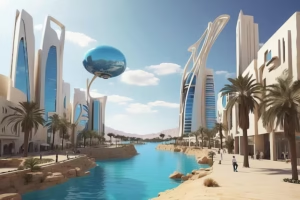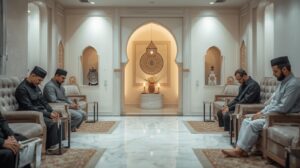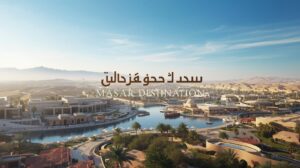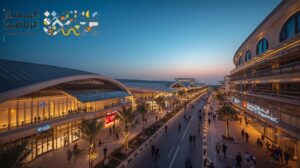The Middle East is transforming at breathtaking speed. For instance, Saudi Arabia is pouring billions into giga-projects like NEOM and The Line. Qatar has stepped onto the global stage with the FIFA World Cup and its National Vision 2030. Oman is shaping Vision 2040 with sustainability and cultural identity at its core. The UAE continues to position itself as a hub for finance, tourism and innovation with long-range plans like Centennial 2071.
Amid this ambition, one truth holds steady: success here depends on people, trust and relationships.
To thrive in this landscape, leaders need cultural intelligence in the Middle East—the ability to build trust, respect, and meaningful relationships.
Global studies show how crucial trust is to business. Edelman’s Trust Barometer reports that:
81% of people say trust is a deal-breaker when choosing companies.
In the Middle East, this principle is amplified. With cultural intelligence in the Middle East, leaders know business deals rarely start with contracts; they begin with relationships.
Take Saudi Arabia’s Vision 2030:
 NEOM: $500 billion smart city project
NEOM: $500 billion smart city project
A European developer bidding for a NEOM sub-project presented strong technical credentials. However, progress stalled until leaders invested weeks in Riyadh, building personal ties and showing genuine interest in local values. Only then was trust secured and the contract.
The same pattern has played out in Qatar.
The 2030 National Vision includes massive public-private projects like the Doha Metro and Hamad International Airport expansion. Firms that invested time in understanding local expectations around relationships and respect were the ones that secured contracts and avoided disputes.
Takeaway: In the Middle East, trust is not a delay to business. Trust is the business.
Respect sustains the trust leaders work to build. This shows up in how companies adapt to cultural and religious traditions.
 During Ramadan, for example, adjusting schedules to accommodate fasting and prayer is more than politeness. It communicates care.
During Ramadan, for example, adjusting schedules to accommodate fasting and prayer is more than politeness. It communicates care.
When a multinational retailer in Dubai shifted leadership meetings to evenings after iftar, employees reported higher morale. The company saw improved engagement during what is usually a tiring season. Respect translated directly into results.
Oman offers another lesson. Vision 2040 emphasises rapid economic growth balanced with cultural preservation. Companies that acknowledge Omani values — family, community, identity — in their programs build credibility faster than those who focus only on KPIs.
At The Yellow Spot, we too have experienced first-hand how cultural intelligence in the Middle East shows up in everyday practices. In Oman, we adapted our training sessions to make space for prayer times. This small act of alignment with cultural rhythms was deeply appreciated by participants and reinforced the bond of mutual respect.
Key Point: Respect is not symbolic here. It is operational.
Cultural intelligence in the Middle East means recognizing that hospitality is not a courtesy, it is a core value. An invitation to share coffee or a meal is often the beginning of a lasting relationship.
Qatar’s $200 billion investment in infrastructure ahead of the FIFA World Cup 2022 highlighted this dynamic. International firms delivering stadiums and transport networks noted that success often depended less on technical capacity, which was expected and more on how well leaders embraced local hospitality. Those who skipped these rituals found themselves isolated. On the other hand, those who embraced them earned trust and smoother collaborations.
Saudi Arabia offers another example:
 Masar Destination, a $26.6 billion project in Mecca designed to host millions of visitors. Companies that actively engaged in traditional hospitality, joining ceremonial welcomes, reciprocating gestures, showing generosity, found approvals faster and partnerships became steadier.
Masar Destination, a $26.6 billion project in Mecca designed to host millions of visitors. Companies that actively engaged in traditional hospitality, joining ceremonial welcomes, reciprocating gestures, showing generosity, found approvals faster and partnerships became steadier.
We have experienced this first hand. After one of our leadership sessions in Oman, a participant invited our team to his burger joint and fed us with extraordinary love and respect. It was not just a meal; it was a gesture that deepened our connection and reminded us how central hospitality is to business and leadership here.
Insight: Hospitality here is not an add-on. It is strategy.
From Riyadh to Muscat, negotiations and approvals often involve layers of conversations and consensus. To outsiders, this may feel slow. However, in reality, patience up front prevents costly mistakes later.
 The Sports Boulevard in Riyadh, a $23 billion project to build one of the world’s largest urban green corridors, involved consultations with planners, cultural committees, and residents. Companies that respected this process found execution smoother. Those who pushed for shortcuts risked losing credibility.
The Sports Boulevard in Riyadh, a $23 billion project to build one of the world’s largest urban green corridors, involved consultations with planners, cultural committees, and residents. Companies that respected this process found execution smoother. Those who pushed for shortcuts risked losing credibility.
In Qatar, the expansion of Hamad International Airport required years of dialogue between government and private partners. Firms that allowed space for this process secured long-term roles. Others, who pressed for speed, lost ground to competitors who understood patience as wisdom.
Lesson: So, in the Middle East, patience is not delay. It is acceleration.
What unites Saudi Arabia, UAE, Qatar and Oman is ambition. These national visions are not modest plans; they are bold blueprints for the decades ahead:
Together, these visions reveal a region determined to shape its own future, on its own terms.
For leaders and companies, cultural intelligence is the way to align with these ambitions. It allows you to connect global expertise with local values, so projects are not just delivered, but embraced.
Truth: Cultural intelligence is the bridge that allows global ambition to align with local identity.
To thrive in this environment, leaders can act on five practical commitments:
The Middle East is writing its next chapter with skyscrapers, giga-projects and national visions. Yet beneath the scale of transformation lies a timeless truth: success rests on people, trust and relationships.
Cultural intelligence allows leaders to honour these traditions while participating in this remarkable future. Those who lead with respect, patience and hospitality will not only win contracts, they will be welcomed as true partners in shaping the region’s most ambitious era.
Our own journey at The Yellow Spot reflects this. In Qatar, we have conducted leadership programs and are now preparing for induction, personal effectiveness, and interpersonal skills trainings.
As for Oman, we have delivered leadership and communication skills programs.
In the UAE, we are gearing up for leadership interventions. Each of these experiences has deepened our understanding that success here is built not just on skills, but on heart and respect. It is this spirit that guides us as we slowly, steadily grow with the Middle East.
To know more about how The Yellow Spot can help you on your Learning journey, Visit ‘https://www.theyellowspot.com’ for more info or reach out at info@theyellowspot.com / India: +91 99677 14310, +91 87792 84314


Blue Arch CHS, Louis School Lane, Four Bungalows, Andheri West, Mumbai – 400053